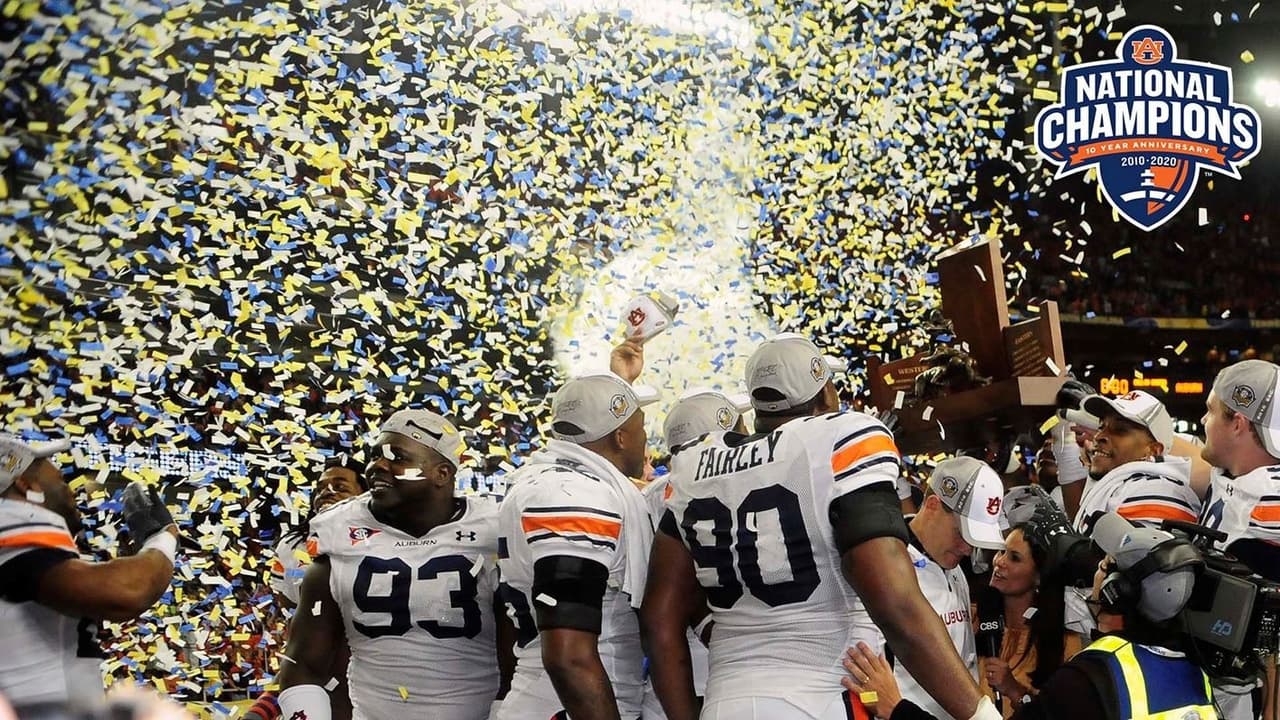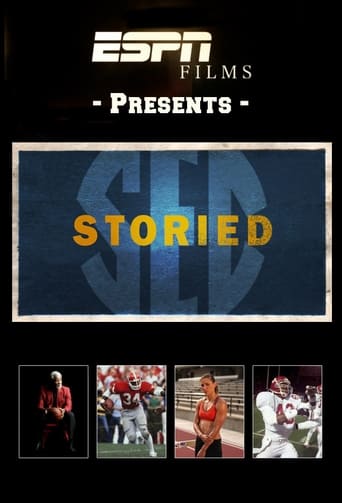SEC Storied Season 1

ESPN Films launched the SEC Storied documentary series in September 2011, presenting fans the opportunity to explore the rich athletic history of the Southeastern Conference. From extraordinary athletes and coaches to defining games and moments, the series has featured films that focus on the SEC's recent and more distant past, including one of the most-viewed documentaries in ESPN history.
Watch NowWith 30 Day Free Trial!
SEC Storied
2011
ESPN Films launched the SEC Storied documentary series in September 2011, presenting fans the opportunity to explore the rich athletic history of the Southeastern Conference. From extraordinary athletes and coaches to defining games and moments, the series has featured films that focus on the SEC's recent and more distant past, including one of the most-viewed documentaries in ESPN history.
Watch Trailer
With 30 Day Free Trial!
SEC Storied Season 1 Full Episode Guide
A phenom from Rochester, NY, Abby Wambach defied convention by spurning soccer dynasty North Carolina in favor of the University of Florida, an upstart program which, at the time, was only in its fourth year of existence. That decision paid off quickly, as in her 1998 freshman season Wambach helped the Gators nab the SEC’s first and only national championship in soccer – defeating the powerhouse Tar Heels in the final. With four SEC Tournament titles, two SEC Player of the Year awards and the title of all-time leading scorer at Florida, Wambach positioned herself as a top pick in the 2002 WUSA draft. Selected by the Washington Freedom, she starred alongside icon Mia Hamm and earned a roster spot on an already talent-laden U.S. women’s national team, for which she has starred for the last decade.
"The Color Orange: The Condredge Holloway Story,” takes an in-depth look at Condredge Holloway, the first African American starting quarterback in the SEC. Kenny Chesney idolized Holloway and even wore his jersey number (No. 7) during his high school football years.
On March 14, 2008, Alabama found itself trailing Mississippi State 59-56 in the final seconds of the first quarterfinal game of the evening session. Crimson Tide guard Mykal Riley sank a last-second three-pointer as time expired, sending the game into overtime. That shot not only extended Alabama’s season for the moment, but it may have prevented thousands of fans from pouring into the city streets just as a tornado touched down outside the Georgia Dome a few minutes later. Though no one in the Georgia Dome was injured, the building felt the effects of the twister. Enough damage was done to the Georgia Dome to not only delay the completion of the Alabama-Mississippi State game and eventually cause a postponement of the last quarterfinal game of the day, but also to force SEC officials to find a new home to finish the tournament on schedule.
In high school Sam Bowie was considered a potential franchise player. Arguably the top recruit in a national class that included Ralph Sampson, James Worthy, Dominique Wilkins and Isiah Thomas, the 7-foot-1 center out of Pennsylvania got off to a strong start at the University of Kentucky and as a member of the 1980 U.S. Olympic basketball team. After Bowie resisted pressure to jump early to the NBA, he continued to raise his level of play as a sophomore. But in a game against Vanderbilt late in the regular season, he suffered what would later prove to be a stress fracture in his left leg. Soon plagued by a long recovery that forced him to sit out two consecutive seasons, he struggled to get healthy. Still, Bowie bounced back as a fifth-year senior in 1984 and helped lead Kentucky to the Final Four.
As the first African American center at the University of Alabama, and one of the school’s first black players, Croom earned All-American honors, won three SEC championships and displayed the “can-do” attitude first instilled by his father, Rev. Sylvester Croom Sr. After playing for legendary coach Paul “Bear” Bryant and then coaching under him for a decade, Croom moved on to the NFL as an assistant coach for 17 years before emerging as a leading candidate for what he considered to be the ultimate position—head coach at Alabama. Though it appeared in the spring of 2003 that Croom was on the verge of being named Alabama’s next head coach, it was Mike Shula who ended up getting the job. But the following year, Croom was named head coach at another SEC school, Mississippi State University, making him the first African American head football coach in the history of the conference as well as leaving him with the formidable task of rebuilding a football program facing NCAA sanctions.
Lolo Jones began chasing her dream in high school. After years of living in poverty and an unstable home life she was determined to be the first in her family to go to college. Constantly looking to improve, Lolo earned a scholarship from the famed Louisiana State University Track and Field program and fought to become the best, among the best. With the help of coach Dennis Shaver, Lolo became one of the most dominant athletes in the history of the LSU Women’s Track and Field dynasty, winning three NCAA Titles and 11 All-American honors, most notably in the hurdles. After failing to qualifying for the 2004 Olympics, Lolo turned again to Shaver for inspiration to continue fighting for her dream. After four years of intense training, Lolo found herself right where she wanted to be—on the 2008 US Olympic team and favored to win gold in the 100 Meter Hurdles.
In the early 1990’s, Arkansas enjoyed unprecedented attention and success. Former Governor Bill Clinton was sworn in as President of the United States while the University of Arkansas became one of the top men’s college basketball programs in America. The man behind the Razorbacks’ rise to prominence was head coach Nolan Richardson and his “40 minutes of hell” playing style – turn up the pressure for an entire game and the opponent will eventually break down. It was an approach that embodied Richardson’s personality. Growing up in El Paso, Texas, the coach endured segregation that he carried with him into adulthood. When Richardson became a coach after his playing days at Texas Western University, he looked for players who could execute his intense full court system. After a successful run at Tulsa, in 1985 Richardson became the first African-American head coach in the Southwest Conference when he took over the Arkansas men’s team.
Directed by Jeff Cvitkovic Narrated by Luke Perry Two decades ago, the SEC decided to expand to 12 schools and host a conference championship game for the first time in college football history. Many thought that this would jeopardize national title aspirations for the schools involved. The additional game was scheduled at the end of the regular season, pitting the league’s two division champions against one other. It was a risk, as the inaugural game in 1992 indicated. Undefeated Alabama normally would have gone straight to a matchup with Miami in the Sugar Bowl with the national championship on the line, but instead was forced to play Steve Spurrier’s Florida squad first for the SEC title. Alabama was on a 21-game winning streak, but the last school to beat the Crimson Tide was Florida, 35-0, just one year earlier. In the fourth quarter of the ’92 title game, it looked like Florida would march to victory once again.
Produced in conjunction with NASCAR Media Group, Herschel explores how Herschel Walker’s career in the SEC was legendary, but his journey off the field was filled with struggle, pain, and ultimately, redemption. Growing up in rural Georgia, Walker was relentlessly bullied for being overweight and having a severe stutter. He turned those taunts into motivation, transforming himself into a superior athlete. Unable to afford weight training equipment, Walker self-trained by doing 5,000 pushups and sit-ups every day after school, racing oncoming locomotive trains and running barefoot in 100-degree heat while pulling a 50-pound tire. He would become a star running back in high school and shatter state records. At Georgia, Walker led the school to its only undisputed national championship, was a three-time All-American and winner of the 1982 Heisman Trophy. He is considered one of the SEC’s and college football’s greatest players ever.
Free Trial Channels
Seasons


























